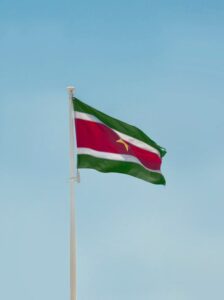Suriname, a small South American country bordered by Brazil, Guyana, and French Guiana, is drawing renewed attention from foreign investors in 2025.
Its growing offshore oil discoveries, gold and bauxite industries, and expanding trade ties through the Caribbean Community or CARICOM make it a compelling, if underexplored, frontier for expat investors.
This guide provides clear, practical expat investment advice in Suriname, covering everything from residency and taxation to the advantages of investing in the country.
It also highlights the country’s emerging fiscal reforms, new VAT system, and recent double taxation treaties that affect foreign investors.
My contact details are hello@adamfayed.com and WhatsApp +44-7393-450-837 if you have any questions.
The information in this article is for general guidance only. It does not constitute financial, legal, or tax advice, and is not a recommendation or solicitation to invest. Some facts may have changed since the time of writing.

Why Invest in Suriname as an Expat
Suriname is not a conventional investment destination, but it offers distinct advantages for expats seeking early-mover opportunities in a resource-driven economy.
Its small domestic market is offset by its strategic geography and untapped reserves of oil, gold, and timber, alongside growing regional integration within the CARICOM.
Key reasons Suriname attracts expat investors:
- Resource Expansion and Offshore Oil Boom
- The discovery of large offshore oil reserves in Block 58, operated by TotalEnergies and APA Corporation, positions Suriname as one of South America’s next major hydrocarbon producers.
- The project reached final investment decision (FID) in 2024, with first oil expected around 2028. Related infrastructure, logistics, and local-content services present strong secondary investment opportunities.
- Stabilizing Economy Under IMF Oversight
- Suriname faced hyperinflation and debt distress earlier in the decade, but macroeconomic reforms under IMF guidance have stabilized the Surinamese dollar (SRD) and improved fiscal discipline.
- New VAT implementation in 2023 and reduced fuel subsidies have improved public revenue, signaling commitment to reform.
- Geographical and Trade Advantages
- Located on the northern Atlantic coast of South America, Suriname functions as a logistical and cultural bridge between Latin America and the Caribbean.
- As a CARICOM member, it benefits from regional trade preferences and double taxation relief under the CARICOM treaty.
- Low Entry Barriers for Small Investors
- Foreigners can establish companies, own urban property, and operate most businesses with few restrictions.
- Real estate and SME-scale ventures in tourism, agriculture, and food processing have low startup costs compared to nearby markets like Guyana or Trinidad and Tobago.
- English-Dutch Business Environment
- While Dutch is the official language, English is widely spoken in commerce, making it easier for expats to navigate legal and administrative systems.
Suriname’s near-term growth will hinge on oil exports, but the government is diversifying through agriculture, forestry, and tourism incentives.
For expats, this is a frontier market with high potential returns balanced by macroeconomic and currency risk. Those who understand the regulatory environment and plan long-term stand to benefit from an economy on the verge of transformation.
Living in Suriname: How to Get Residency
Suriname does not operate a formal residency-by-investment or golden visa program.
Foreign investors who wish to live or establish a business in the country must apply through existing immigration and labor channels administered by the Ministry of Justice and Police Foreigners’ Affairs Department (Onderdirectoraat Vreemdelingenzaken).
Main residency pathways for expats:
- Employment-based permits. A foreigner can obtain a residence and work permit through local employment, usually sponsored by a registered Surinamese company. The permit allows long-term residence as long as the employment relationship remains valid.
- Business ownership. Investors who register a local company (such as an N.V. or B.V.) can apply for residence as managing directors or self-employed entrepreneurs. Proof of capital, business registration with the Chamber of Commerce (KKF), and a clean police record are required.
- Family reunification or retirement stay. Expats with local family ties or long-term residents may apply for family-based residence. Retirees can be granted residence if they can prove sufficient pension or savings income.
Application procedure:
- Apply through the Vreemdelingenzaken office in Paramaribo. Required documents typically include a valid passport, proof of funds, health certificate, police clearance, and business or employment documentation.
- Upon arrival, visitors must complete an Immigration & Customs Form (ICF) and declare purpose of stay.
- Residence permits are initially issued for one to two years and may later qualify for vesting, or permanent residence, after several renewals.
There are no official fast-track investor visas, but in practice, applications backed by legitimate business activity and local economic contribution receive favorable review.
Residency permits form the foundation for tax residency, business ownership, and property rights, making early compliance crucial for investors who plan to operate long-term.
Suriname Tax Residency Rules for Expats

Tax residency in Suriname is based on physical presence and permanent ties. An individual is considered a resident for tax purposes if they live in the country for more than half the year or maintain a dwelling available for continuous use.
Residents are taxed on their worldwide income, while non-residents are liable only for Suriname-source income such as local employment, dividends, or business profits.
How tax residency affects expats:
- Resident expats: Pay income tax on all earnings, both local and foreign, though credits may apply under double taxation treaties.
- Non-resident expats: Pay tax only on Surinamese-source income, such as wages from a local employer or rental income from property in Suriname.
- Borderline cases: Those working remotely or temporarily in Suriname should keep clear records of time spent in the country and income sources to avoid double taxation disputes.
Suriname’s tax year runs from January 1 to December 31, with personal income tax filed annually. Employers are responsible for wage tax withholding, deducted monthly from salaries. Freelancers and business owners pay estimated tax in advance.
The Suriname Tax Authority is digitizing its systems, introducing an online filing platform that will streamline returns in the coming years. Common deductions include contributions to pensions, mortgages, and education costs, though these can vary.
Expats should confirm their residence status each year with the Belastingdienst (Tax Department), especially if they maintain income or assets abroad.
Proper documentation ensures compliance with both Surinamese and foreign tax authorities, particularly for those relying on CARICOM or bilateral tax treaty relief.
Suriname Personal Income Tax
Suriname’s personal income tax system applies to both residents and non-residents earning income within the country.
Income tax rates are progressive, with lower brackets applying to basic earnings and higher brackets (historically in the 30–38% range) applied to upper income tiers.
Rates and thresholds are reviewed annually, and employers must use current tax tables when calculating loonbelasting (wage tax).
Suriname Corporate Income and Withholding Tax
Companies registered or managed in Suriname are considered resident entities and are taxed on their worldwide income.
Foreign companies with operations or permanent establishments in Suriname such as a branch, construction site, or local agent are taxed on income generated within the country.
Corporate income tax (CIT):
- The standard corporate tax rate has historically ranged around 36%, though reforms are under consideration to modernize and reduce this rate for competitiveness.
- Corporate tax applies to net profits after allowable deductions such as operating costs, depreciation, and interest expenses.
- Losses may be carried forward for several years, subject to conditions.
Withholding taxes (WHT):
- Dividends paid to non-residents are subject to withholding tax, typically around 10–25%, though treaty rates can reduce this.
- Interest and royalties may also attract withholding tax unless exempt under a double taxation agreement.
- Payments to non-resident contractors can be treated as business income and taxed through the PE mechanism if services are performed locally.
Foreign investors should also monitor upcoming tax reform plans, as the government continues to align its corporate and VAT regimes with IMF recommendations for broader fiscal modernization.
How the Suriname VAT Act Affects Expat Businesses
Suriname’s Value-Added Tax (VAT) system was implemented on January 1, 2023, replacing the old turnover tax.
For expats operating small businesses, the VAT regime may seem onerous at first but offers predictability. Input VAT on business-related expenses can be credited against output VAT, reducing the final tax burden.
This reform was a central part of the country’s fiscal stabilization efforts and now affects nearly every business transaction in the country, including those involving expatriates and foreign investors.
Key features of Suriname’s VAT regime:
- Standard rate: 10% on most goods and services, with certain essential items exempt or zero-rated.
- Registration threshold: Businesses with annual turnover exceeding SRD 1 million must register for VAT. Smaller entities can opt in voluntarily if they wish to claim input credits.
- Filing and compliance: VAT returns are submitted monthly. Registered entities must maintain proper invoicing and accounting records in Dutch or English.
- Imports and services: VAT applies to the importation of goods and to cross-border services rendered in Suriname. This includes consulting or digital services provided by foreign companies to local clients.
Sectors exempt or partially exempt from VAT:
- Financial services, healthcare, and education
- Certain agricultural products and raw materials
- Specific government-regulated activities and exports
Businesses dealing with multiple supply chains such as logistics, tourism, or oil support services should confirm how VAT applies to composite contracts.
In practice, foreign investors often partner with local VAT-registered entities to streamline compliance and ensure input tax recovery. It is recommended to seek the services of a financial advisor you trust.
Can foreigners buy property in Suriname?
Yes, foreigners can buy property in Suriname. Urban freehold property is generally open to foreign ownership with few restrictions, allowing expats to purchase homes, apartments, and commercial buildings outright.
These transactions must be notarized and registered at the Mortgage Office (Hypotheekbewaring) to ensure clear title.
However, foreigners cannot directly own agricultural or rural land classified as state property. Such land is usually held under long-term lease arrangements, known locally as “grondhuur” (land lease rights), granted by the government.
Expats can still acquire these rights through locally incorporated companies, subject to government approval.
In practice, many expats buy property through local entities or partnerships to simplify financing and inheritance rules.
Property investment remains an accessible option in Suriname’s urban centers particularly Paramaribo, where freehold land is more common, but it requires careful verification to avoid disputes or invalid transfers.
Pained by financial indecision?

Adam is an internationally recognised author on financial matters with over 830million answer views on Quora, a widely sold book on Amazon, and a contributor on Forbes.




I am looking at retirement in a few years and would like to look at a house purchase there and the requirements and caveats.